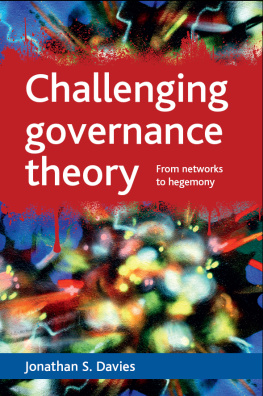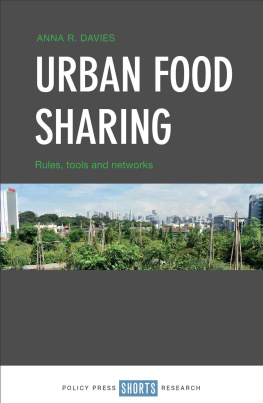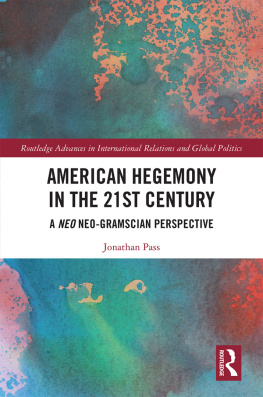
First published in Great Britain in 2011 by
The Policy Press
University of Bristol
Fourth Floor
Beacon House
Queens Road
Bristol BS8 1QU
UK
Tel +44 (0)117 331 4054
Fax +44 (0)117 331 4093
e-mail tpp-info@bristol.ac.uk
www.policypress.co.uk
North American office:
The Policy Press
c/o The University of Chicago Press
1427 East 60th Street
Chicago, IL 60637, USA
t: +1 773 702 7700
f: +1 773-702-9756
e:sales@press.uchicago.edu
www.press.uchicago.edu
The Policy Press 2011
British Library Cataloguing in Publication Data
A catalogue record for this book is available from the British Library.
Library of Congress Cataloging-in-Publication Data
A catalog record for this book has been requested.
ISBN 978 1 84742 614 7 paperback
ISBN 978 1 84742 615 4 hardcover
The right of Jonathan S. Davies to be identified as author of this work has been asserted by him in accordance with the 1988 Copyright, Designs and Patents Act.
All rights reserved: no part of this publication may be reproduced, stored in a retrieval system, or transmitted in any form or by any means, electronic, mechanical, photocopying, recording, or otherwise without the prior permission of The Policy Press.
The statements and opinions contained within this publication are solely those of the author and not of The University of Bristol or The Policy Press. The University of Bristol and The Policy Press disclaim responsibility for any injury to persons or property resulting from any material published in this publication.
The Policy Press works to counter discrimination on grounds of gender, race, disability, age and sexuality.
Cover design by Qube Design Associates, Bristol
Front cover: image kindly supplied by www.alamy.com
Printed and bound in Great Britain by Hobbs, Southampton
The Policy Press uses environmentally responsible print partners
Readers Guide
This book has been optimised for PDA.
Tables may have been presented to accommodate this devices limitations or/and use scroll function for a complete review of the tables as and where needed.
Image presentation is limited by this devices limitations.
No one is doing networks (Anonymous)
I think we have gone slightly network mad (Anonymous)
The centralized state machinery entoils (inmeshes) the living civil society like a boa constrictor (Karl Marx, 1871, The Civil War in France , 1st draft)
I am very grateful to Jan Hurst for allowing me to quote two insightful respondents from her doctoral study of governing networks.
For my mother, Sonia Gerda Davies
List of tables
Preface
The claim that governance is increasingly about networks was becoming the established orthodoxy when I embarked on my graduate studies in the mid-1990s. My suspicions about this new orthodoxy were provoked immediately; partly by my dislike of postmodernism, partly because it ignored dramatic upward concentrations of wealth and power occurring at the same time and partly because empirical research seemed to contradict it. My work thereafter only fuelled this scepticism, ultimately suggesting the need for a completely different understanding of network governance. This volume pulls together various strands of critique by myself and others and advances an alternative based on a Marxist reading of Gramsci. Naturally, it draws liberally on my previously published work the relevant sources are recorded in the list of references but takes it in a new direction. The book argues that network governance is part of the hegemonic strategy of neoliberalism the visionary, utopian and profoundly flawed regulative ideal of late capitalism. It was inspired by the debate about challenging orthodoxies and developing critical governance research that we have been having at the University of Warwick since 2008, culminating in the Critical Governance Conference in December 2010 (see http://go.warwick.ac.uk/orthodoxies).
I am very grateful to colleagues who helped me write the book. Colin Crouch, Mike Geddes and Helen Sullivan commented astutely on the draft manuscript and I hope to have done some justice to their insights. I thank other colleagues past and present in the International Centre for Governance and Public Management (IGPM) at Warwick for many stimulating discussions. I single out John Benington, Crispian Fuller, Kevin Morrell, Ines Newman and Penelope Tuck. Others who have been a source of great encouragement and inspiration in recent years include Steve Griggs, David Imbroscio, Chris Skelcher, Clarence Stone and David Wilson, and many friends at the Political Studies and Urban Affairs associations and the recent Critical Governance Conference. I am grateful too to the anonymous reviewer who made very valuable comments on the draft manuscript. The Policy Press have been model publishers and my thanks go particularly to my editor Emily Watt for encouraging me and keeping me on track. Many thanks are also due to her colleagues, Jessica Hughes, Kathryn King, Jo Morton, Charlotte Skelton and Laura Vickers, without whom the project would not have come to fruition. I am most grateful to The Policy Press for publishing my work. Otherwise, the usual disclaimers apply. I apologise for errors of fact and interpretation, which are solely mine.
Jonathan S. Davies
31 March 2011
Introduction
For a generation, scholars, politicians, officials, activists and public intellectuals have celebrated the transformative potential of networks across government, economy and society. The network is the leitmotif of postmodernist social science, encompassing everything from radical anti-foundationalism to neo-Marxism and everyday theories of governance, public administration and public policy. Network analysis is applied to a vast range of social phenomena, inter alia to describe, model, analyse, explain and justify them. From the radical left to the libertarian right, scholars celebrate networks alongside their antagonists in mainstream public administration and policy. International corporate elites depict themselves and their companies as networked and networking as the medium of innovation in the age of informational or knowledge capitalism (Boltanski and Chiapello, 2005a). Across much of the world, from the UK and the US to mainland Europe, Scandinavia, Mexico, South Africa and the Antipodes, and at every geopolitical scale from the neighbourhood to the global, networking is proselytised as the way to conduct governance, intergovernmental relations, management and relations between government and civil society and indeed as the best way to organise resistance. In short the metaphor of the network has progressively taken responsibility for a new general representation of societies (Boltanski and Chiapello, 2005a, p 138). It has become a common form that tends to define our ways of understanding the world and acting in it and the tendency of this common form to emerge and exert its hegemony is what defines the period (Hardt and Negri, 2004, p 142). Zeldins (1994, p 488) paean to the network epitomises the celebratory mood:
I see humanity as a family that has hardly met. I see the meeting of people, bodies, thoughts, emotions or actions as the start of most change. Each link created by a meeting is like a filament, which, if they were all visible, would make the world look as though it is covered with gossamer. Every individual is connected to others, loosely or closely, by a unique combination of filaments, which stretch across the frontiers of space and time.













